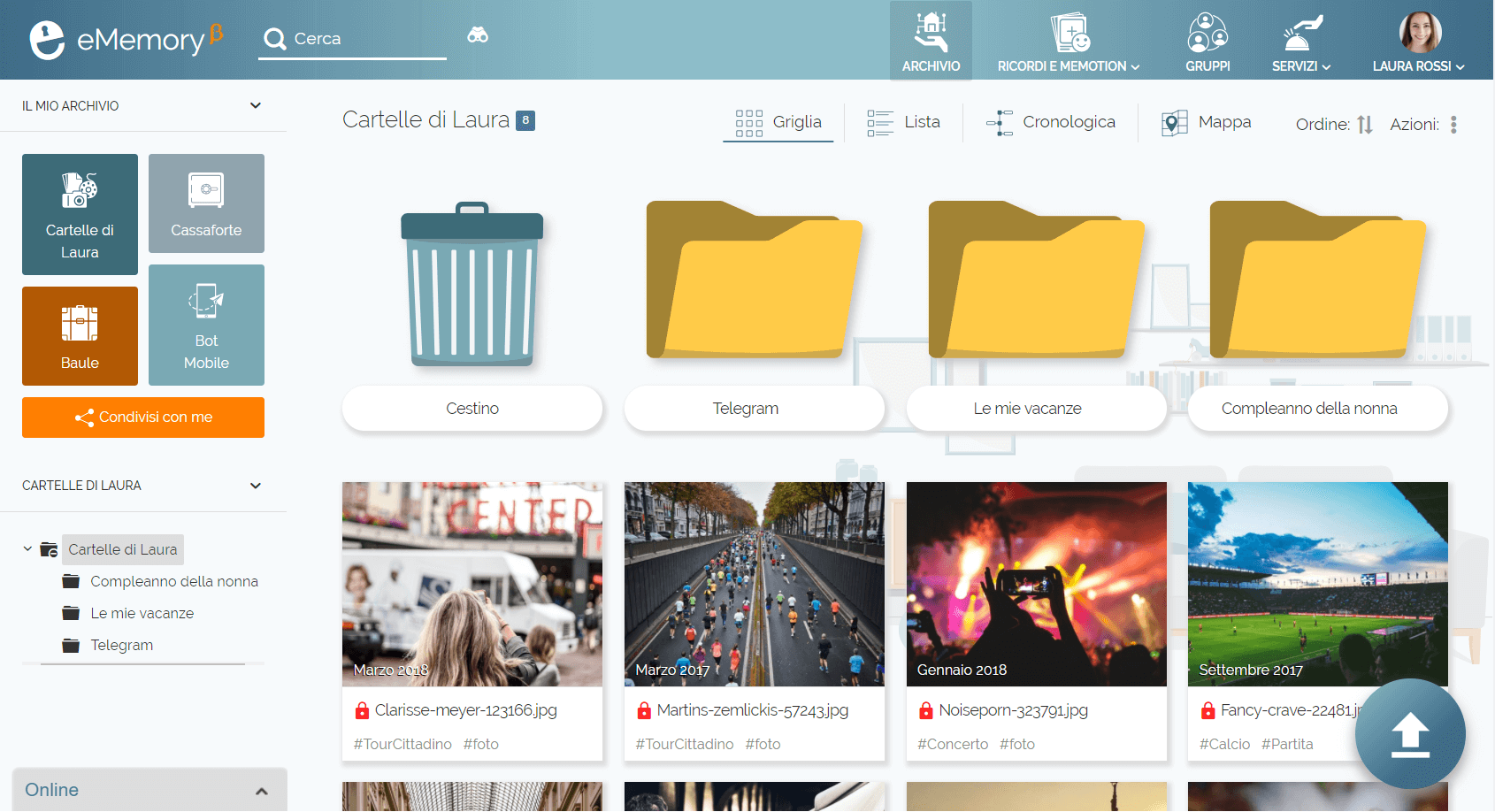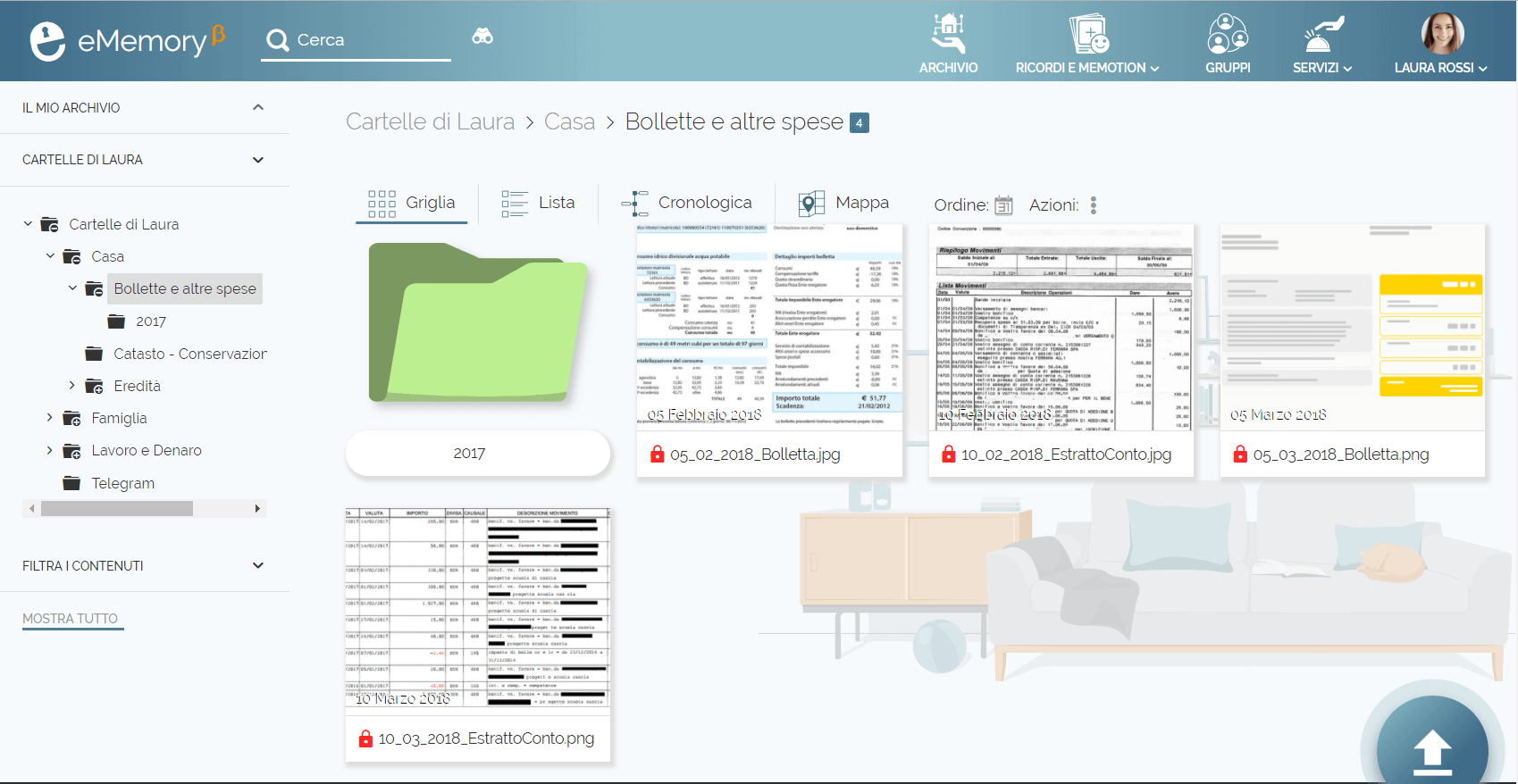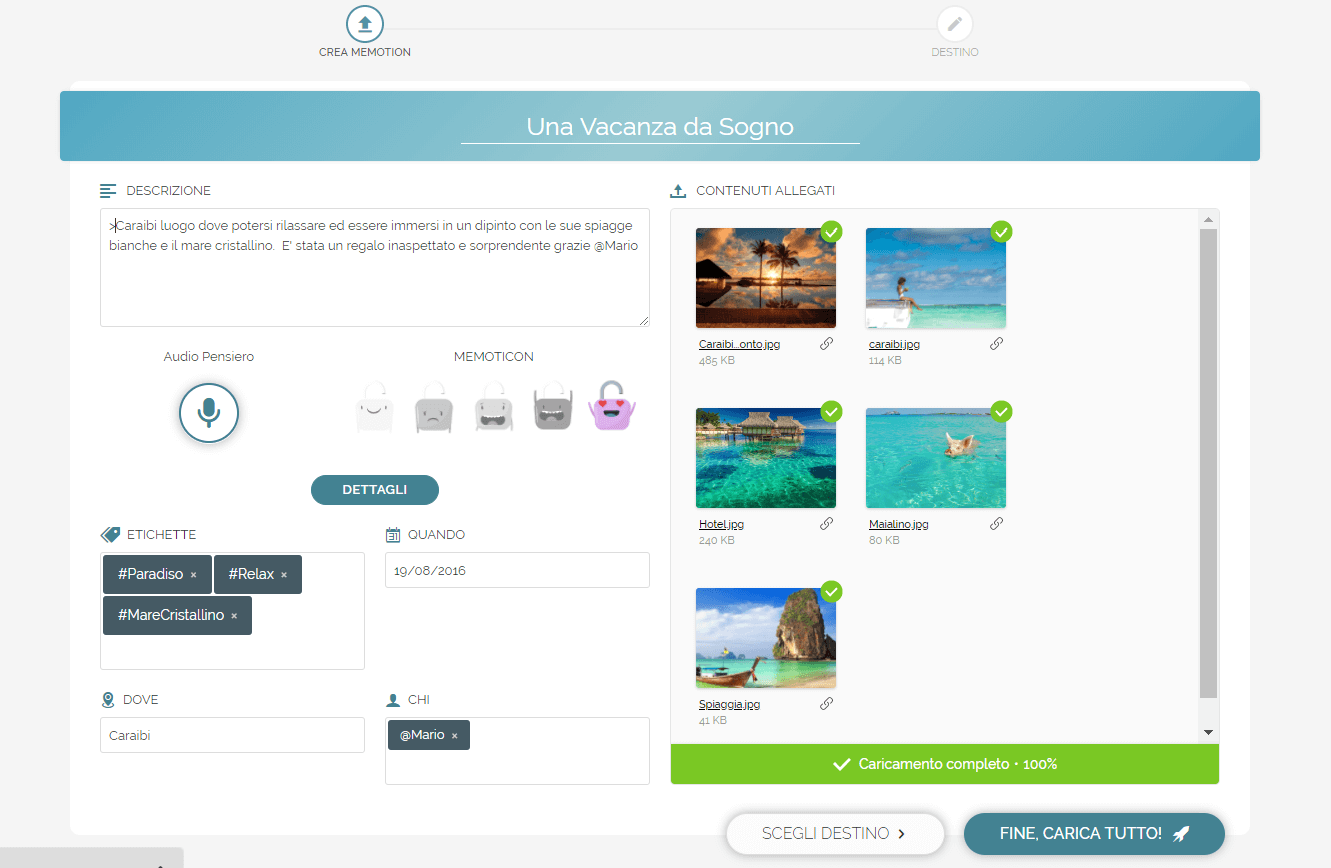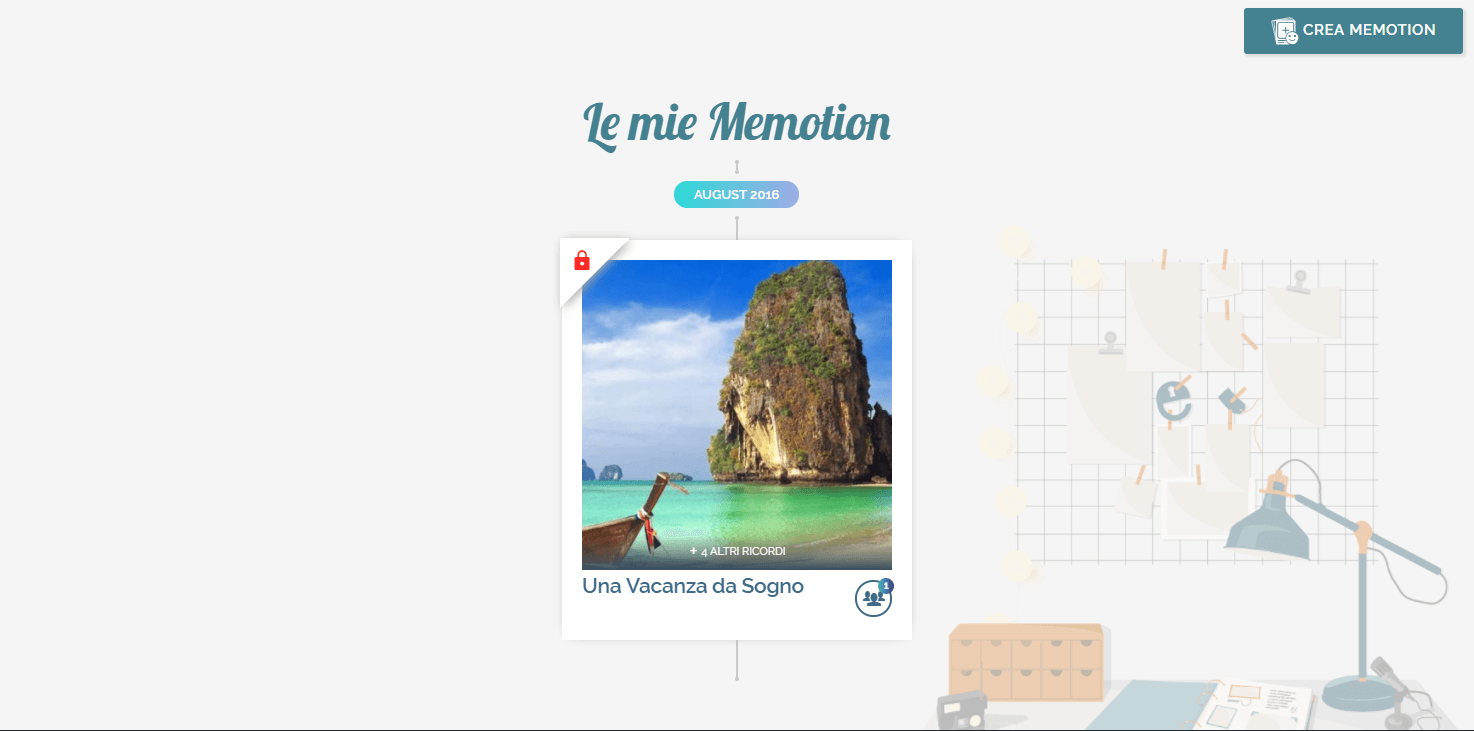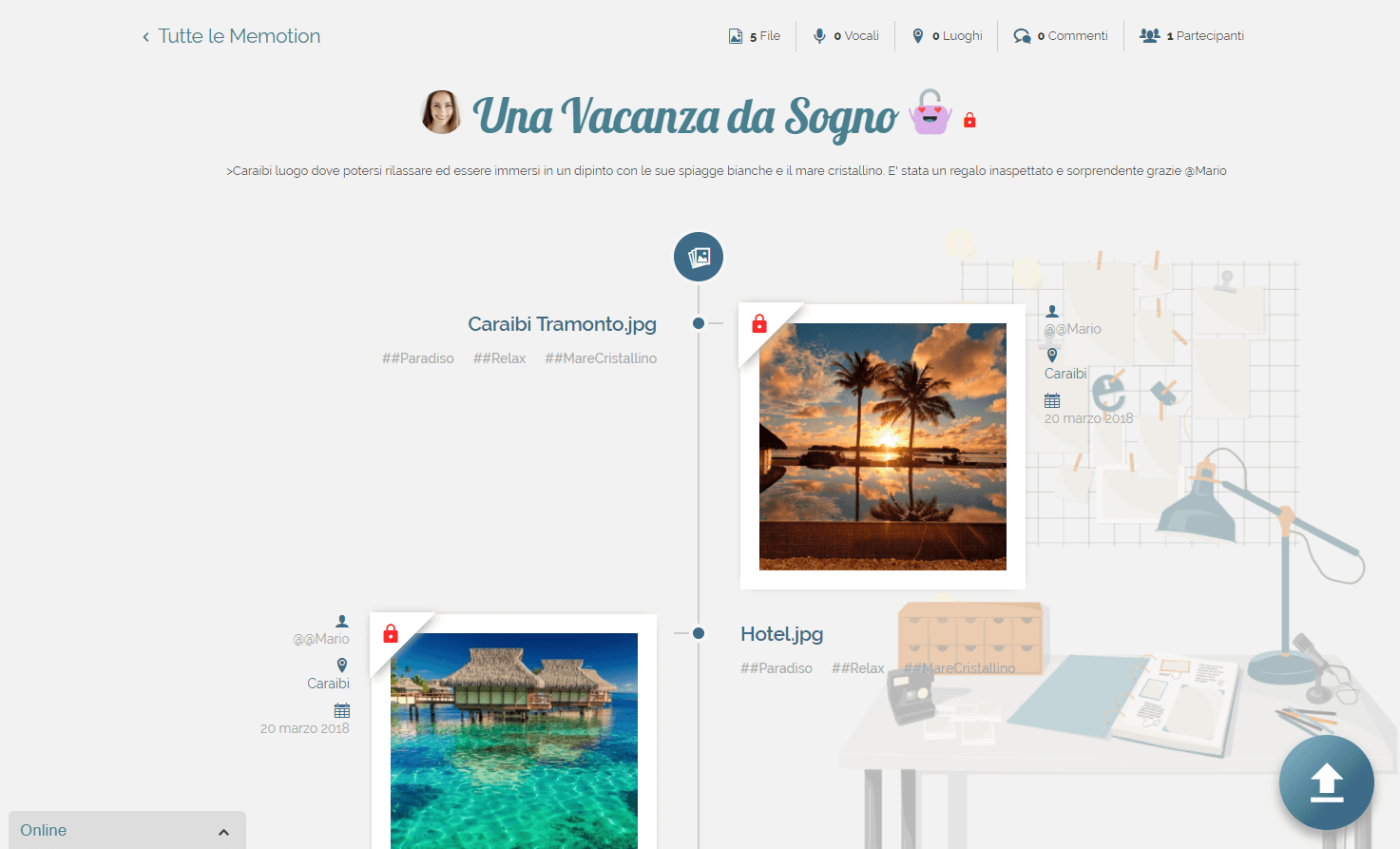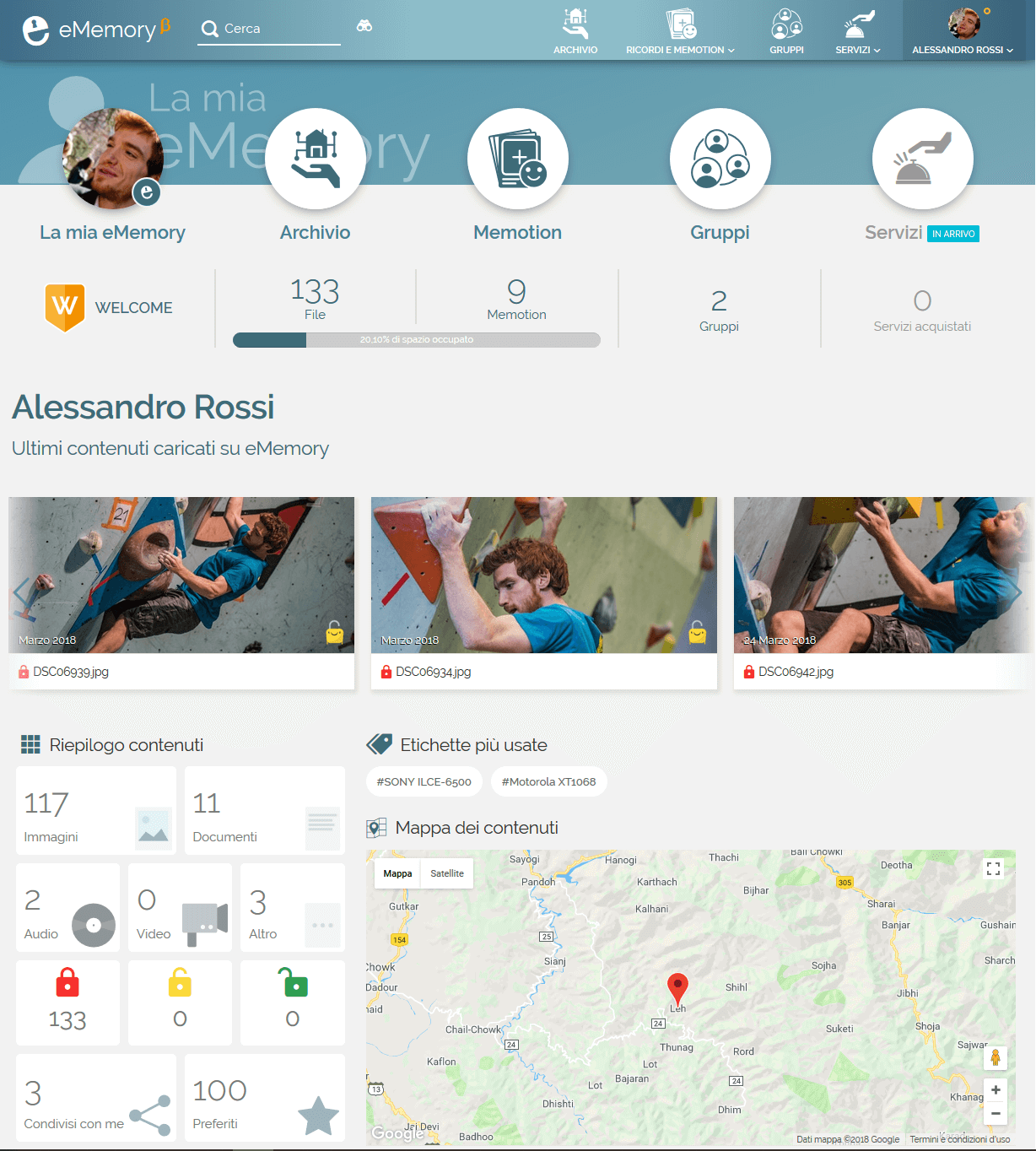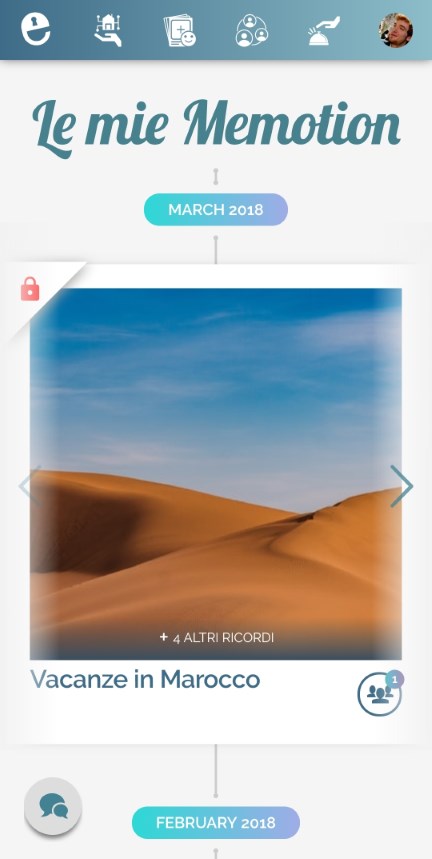eMemory in Depth
eMemory
in brief
eMemory is a digital platform with no commercial data profiling, dedicated to the preservation and enhancement of individual and shared memories. It offers the opportunity to keep your digital files in a secure environment, build up shared memories and manage the legacy of your digital heritage. eMemory supports memory conservation projects, promoted and developed with the active support of our users.eMemory favours quality over quantity: its sharing methods between communities and users with common interests promote a greater awareness on the web, and its targeted storage and saving functions, based on common file elements, allow you to build up your story in a safe and comfortable place.
eMemory aims at being the answer to all those problems we experience today with digital legacy, as we tend to hoard digital data without making full use of their real value.
Through our assisted storage processes, you can upload and apply different labels to your digital files (text, images, video, audio and more), save them in folders inside your personal account, and choose their legacy settings using our coloured locks (Padlock System). The red lock determines the total deletion of files after your death, the yellow lock allows you to choose a list of people with whom you wish to share your files (starting from a given date and, if you wish, for a given amount time), while the green lock makes your files visible to the whole eMemory community.
Who we are
and who
we work with
EXIT.BIO s.r.l. is the company building and operating the eMemory platform, and holding its trademarks and patents. It was founded in September 2012 to develop software services aimed at the issues related to environmental and social sustainability. From 2015 its activities have been fully dedicated to the design of the eMemory platform. Its current partners include: Pietro Jarre - President and creator of eMemory. He has a PhD in Geotechnical Engineering and a degree in Civil Engineering. He has worked at the development of business companies in several fields of innovation – environment, information management and monitoring – both in Italy and abroad. Director and co-founder of about 15 companies located in different European countries, he has contributed to their development and led them to reach a turnover of nearly one hundred million euros. As Vice President of Golder Associates group (employing about 8,000 people), he has directed its technical and commercial development throughout the world, and its subsequent growth, until the end of 2014.
Giuliano Nozzoli - CEO. With a degree in Political Sciences, he is a former manager of Turin city council and an expert in historical and bibliographical research.
Our in-house developer is Alberto Trivero. He has a degree in Computer Engineering and an expertise gained over almost ten years in the field of computer security, first as an independent researcher, when he published several "security advisories" and technical documents, and later as a consultant to credit, energy, transportation, real estate and IT companies.
Examples
of use
The basics
of
eMemory
- Digital legacy
- Ecological use of digital data
- Impact of eMemory on the Web
Digital legacy
eMemory was first conceived starting from several reflections on digital legacies, summarized here below.
Digital legacy - the problemIn recent years we have witnessed an increase in legal disputes over the ownership and use of digital data belonging to deceased people. On our PCs, tablets and smartphones we now store almost everything, and often much more than what we wish to keep as a souvenir.
Whereas the purchase contract for our home or the results of our medical tests are well kept in our physical archives (for now, but it appears most likely that in a few years these will be digital too), our digital data are hoarded and left unorganized, in the vain hope that they will anyway prove "eternal" or that we can always "sort them out" at a later time. This is not true, and the problem is well known to anyone who has ever lost a mobile phone, broken their pc or been infected with a virus such as as Cryptolocker.
We hoard a lot of data but do not protect them as we would with something valuable, and we do not give clear instructions about the destiny we choose for them: in addition to losing many opportunities during our lifetime, we also cause unpleasant situations or serious problems when we die or when we are no longer able to take autonomous decisions.
Digital legacy - the risks of accessibilityThe first risk of this kind is due to the fact that nobody has our passwords. Therefore it will not be easy - and not even legal unless we state so in our will - for others to access the data we leave behind, assuming that our devices are still operable at the time we are no longer here.
The second risk is that we entrust the wrong people with our passwords, and / or that someone gains access to files they are not supposed to see.
The third risk concerns the actual ownership of data. Do we really own the ones we stored on our company laptop or shared on social networks? Of course not.
Digital legacy - the risks of hoardingThe risk today is to preserve, and therefore to leave behind, an overgrown and unorganized mass of data. Which really amounts to preserving and leaving nothing behind. This is mainly due to the direction in which digital technology has been driven, i.e. to prioritize quantity (of users, bytes, files) over quality.
An excessive amount of data is an obstacle to their proper preservation and transformation into information and knowledge. If we keep considering thousands of "facts", there is no way we can write down a "chronicle" of what happens to us, or tell our "story". All the tiles of the vast mosaic making up our knowledge and allowing us to express our wisdom will remain unorganized and meaningless, wasting a greater amount of energy and environmental resources.
With eMemory we aim at giving a concrete answer to the growing demand for a secure way to preserve and enhance our digital data, for the construction of our own digital heritage, and for the management of our digital legacy. This answer is very similar to the one provided by banks and insurance companies for material wealth, and uses the same keywords - heritage, safe deposit box, enhancement
Among the most significant data we own, there are undoubtedly the photographs that portray our lives. Until 50 years ago, having a camera to take pictures with was a luxury, therefore we tended to limit its use to really important occasions. Today, we all can take thousands of photos even though we very rarely print them, leaving them stored in some old forgotten memory card or on a cloud service to which our dear ones / heirs will probably never gain access. The access cost to technology has dropped, but perhaps we chose to sacrifice on the altar of progress the individual value of memories.
Ecological use of digital data
Data should be archived with an attention to the context in which they were born, and properly tagged according to the intimate and personal meaning they have for us, including their emotional connections and their destiny as digital legacy. Thus organized, we believe these memories should become the seeds of a further growth that will enable their continued circulation on a higher level. This fruitful new circulation will allow both individuals and communities to build up their own memory, identity and awareness.
Compared with the current (lack of) attention given to more effective storage methods for personal and family data, our ecological use breaks away from the dominant consumerist approach, and opens the way for a sustainable use of digital data - our memories - and for their new circular and sustainable economy. This can be achieved because the ecological use of digital data constitutes a working environment specifically suited to enhance and capitalize memories - weaving together both individual and collective memories - where raw basic data can become useful bricks to build up identity and awareness, both on an individual and a collective level.
Impact of eMemory on the web
Together with others, eMemory has created the Sloweb association to tackle some important and still unsolved problems in web user experience:
- the need for a responsible use of the web
- the need to protect the privacy of data and control their destiny
- the need for a proper digital legacy
- the need to select good quality data and use them to build up their memories
- the need to oppose the improper use of the web, both by governments and individuals.
Building eMemory together
A user-built web platform
Do you have any ideas for new ways to use and approach eMemory?
You are invited to “cook” them with us. Our kitchen is the place where we are preparing our future products. It has glass walls and opened doors.
Please come into the kitchen and work with us. Let us discuss together the next recipes we want to try. Our vision is to learn from our users. To unleash your creativity and build the platform together, to reach success together.
Collaborate
with
eMemory
Are you an organization looking for funds for your memory-keeping projects?
eMemory is a user-owned web platform. Are you developing any memory-keeping programs? Are you looking for someone to go on this journey with you? Are you looking for funds?
We at eMemory want to commit all our energies to the "preservation of memory". For this reason we intend to allocate an important portion of our profits to memory-keeping projects.
eMemory can fund existing projects, or create new projects based on user advice. You can become protagonists in the realization of these projects, creating communities based on a given territory or a specific activity. We can work in partnership with companies and associations, potential sponsors and project promoters, or facilitators for specific projects.
Are you a professional of memory-keeping?
eMemory is a job-generating platform!
Can your work be useful to eMemory users? Do you have experience to spare?
The platform will offer to our users a range of additional services, e.g. the digitalization of physical documents, the selection of the most valuable ones, assistance in building digital biographies and archives.
DO YOU HAVE EXPERIENCE TO SPARE? CONNECT WITH US AND OTHER PROFESSIONALS / CRAFTSPEOPLE / WORKERS OF MEMORY-KEEPING LIKE YOU
Among the first areas of application, we have thought of:
Writing
Images
Videos
Audio
Genealogy
Antique trade
Fashion
Music
Psychotherapy
Legal advice
Notarial consulting
Do you have other ideas? Write to us!
Invest
in
eMemory
A user-owned web platform
Are you interested in becoming a shareholder? Are you curious and want to learn more?
We have already started forms of user participation to several choices in the development of our eMemory platform and its services.
Here is why:
- It gives a real value to your subscription fee ("I paid for it because it is mine")
- It gives a voice to our users, getting you involved in the life of eMemory and in our basic choices
- It breaks away from the most popular actors in the digital arena and really puts digital democracy in practice
- It supports our intent to realize shared projects for the preservation and enhancement of collective memory.
Frequently
Asked
Questions
Yes. The procedure is easy. We are developing a mobile app compatible with the most common platforms to make this process as simple as it can be.
You can upload all your files to eMemory - repeating this procedure regularly - and keep them in a temporary folder up in the attic. However, we then suggest that you select, enhance and organize in specific folders only the files that are really important for you.
When a file is uploaded, a message will appear on the top right of the screen. Take your time doing things, and always read these messages. There is no hurry on eMemory.
Open the image file and click on "edit image". Do not forget to save when you are done. Always read the messages on the top right of the screen.
You cannot edit Word files directly on eMemory. However, you can download the files, edit them and upload them again: the old files will be updated.
There is no limit. We recommend not to use more than 30 folders: you do not want it to get too crowded in your house. Instead, we suggest using with care our many tag options.
Because only eMemory users can see, with the file itself, all the information on its context. If you just wish to share an image or a text, you can use your email. However, using your email you lose control over the ownership of the file. Moreover, if you like eMemory and the service it offers, you may wish to talk about us to your friends and family.
Of course. When you invite someone, you can send them a message and tell them everything.
Because the purpose of a social network is to put people in contact. This is possible with eMemory, but it is not our primary purpose.
Because the purpose of a file hosting service is to store large amounts of data that are usually left without context. With eMemory you can store large amounts of dat,a but it is not our primary purpose.
All file transfers from your device to our server are encrypted. The data centres we use can guarantee state-of-the-art security levels.
You can request us to send to a specified address a physical copy of your data on a data carrier. This service has a fee. Your data will be protected by a password chosen by you alone.
Our prices are comparable: they are slightly higher because we offer several other services and are committed to allocate a large part of our revenues to the funding of memory-keeping projects.
According to our vision, eMemory is user-owned. Should this become practically impossible, however, we may have to take a different course.
No. The same applies to other police forces. We are bound and we want to comply with national regulations that apply in different countries.
Should our company shut down, your files will no longer be accessible. We will make every effort to inform you in advance and invite you to get a physical copy of all the data uploaded to the platform.
The company that owns of the platform is is bound to comply with this condition. Please find this in our "Terms and conditions".
Yes. Several users have let us know that they wish to use eMemory to edit and store files for their work. Many products of the work of individuals are also part of their personal heritage. These should be developed and stored on our eMemory platform.
We follow a procedure described in our Data Management Agreement. You can find the Agreement at the bottom of each page on the platform. The procedure considers three possible situations:
- An eMemory user reports another user's death and uploads a valid death certificate
- The Notary appointed by the user uploads a valid death certificate
- A user is inactive for a long time: our staff tries to contact them and learns of their death
In any case, death must be certified by a legally valid document.
This is also contained in our Data Management Agreement that can be found at the bottom of each page of the platform. You have chosen the destiny of every single file uploaded to the platform.
This is described in our Data Management Agreement, that can be found at the bottom of each page on the platform. You have chosen how you want your files to be delivered. Your heirs, namely the members of your lists, are notified of your death by eMemory. They will receive the files electronically. We are also considering the possibility to deliver files in physical form.
Do you have other question that can be useful to all users? write to us and we will add them in this section
